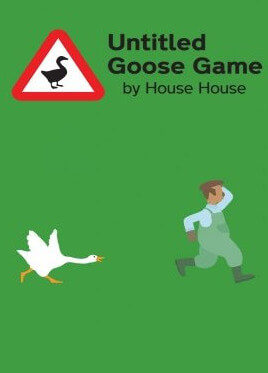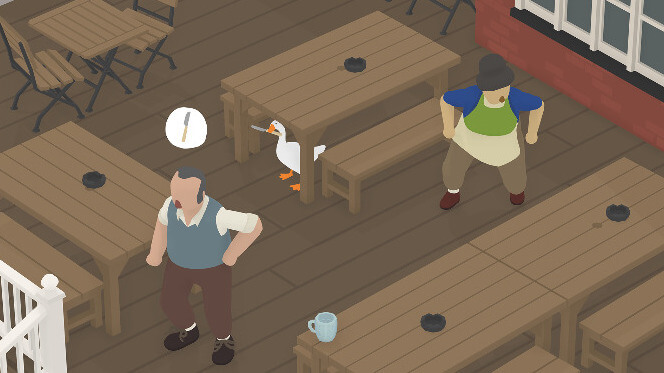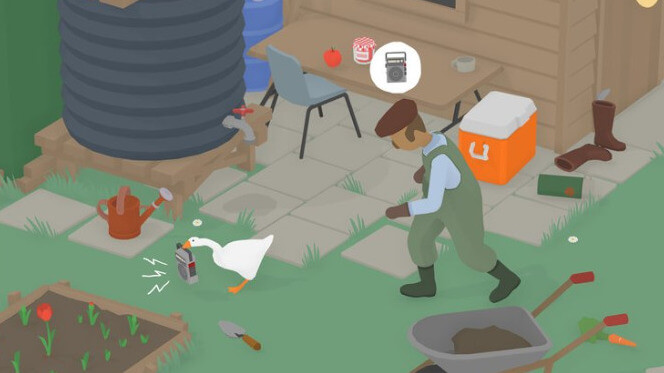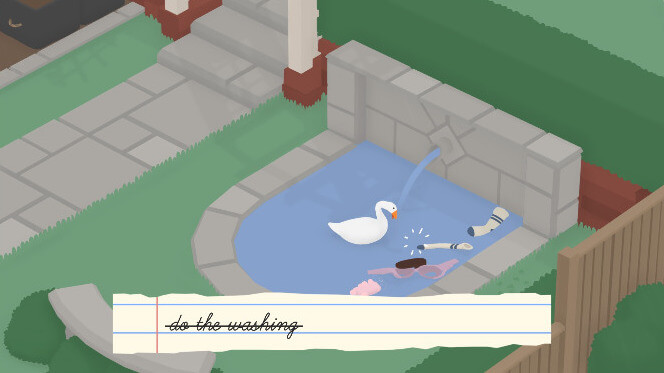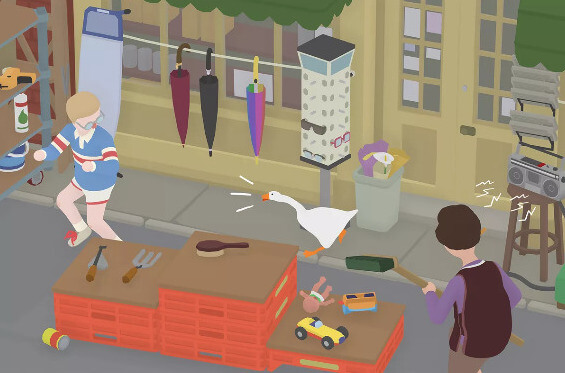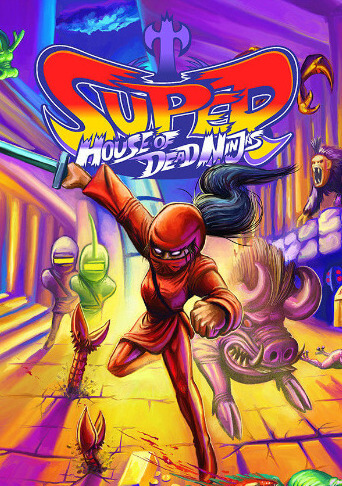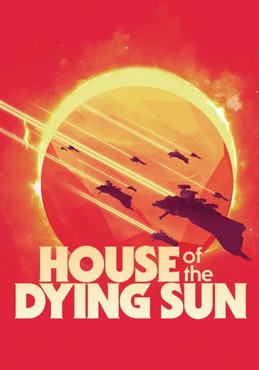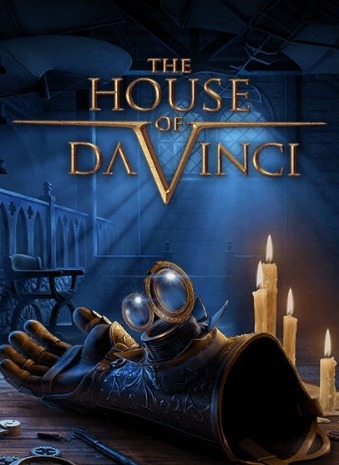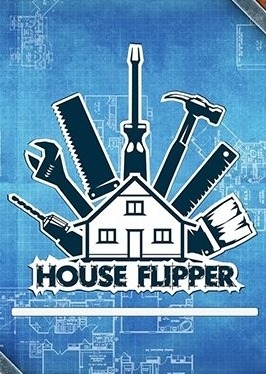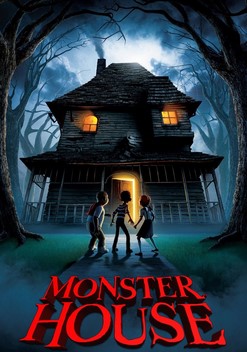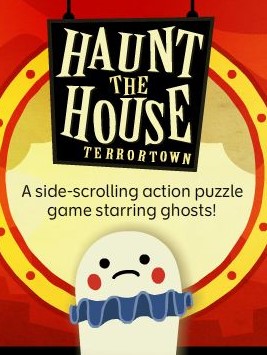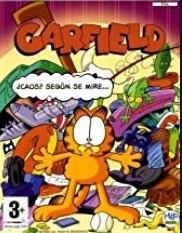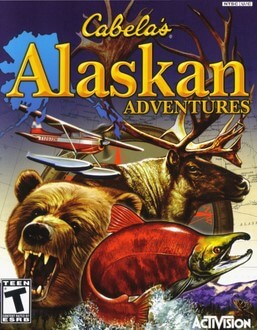Set in an idyllic English village, players control a goose that can honk, duck down, run, flap its wings, and grab objects with its beak to bother various human villagers. The village is split up into multiple areas, each of which has a list of objectives, such as stealing certain objects or tricking humans into doing certain things. When enough of these objectives are cleared (one less than the total), an additional objective is added which, once cleared, allows the goose to move on to the next area. After completing four areas, the goose enters a miniature model of the village. There, the goose steals a bell before going back through the previous areas while the villagers try to stop it. In the game's ending, it is revealed the goose had stolen many bells before the game's events. There are also several hidden optional objectives, many of which require traversing multiple areas or completing an area within a time limit.
Development and release
Untitled Goose Game originated from a stock photograph of a goose that a House House employee posted in the company's internal communications. This sparked a conversation about geese, but the team put the idea aside for a few months until they realized that it had the potential to be a fun game. The game was developed by four-person indie studio House House, based in Melbourne, Australia, and was published by Panic for Windows, macOS, and Nintendo Switch on September 20, 2019. The game is House House's second project, and like their debut, was supported by the government organisation Film Victoria, who assisted the studio in getting set up properly.
House House cited Super Mario 64 as the initial inspiration for the type of game that they hoped to build. They wanted the player to control a character who could run around in a 3D environment. Their previous game, Push Me Pull You, had 2D art with flat colours. They used a similar aesthetic in Untitled Goose Game by choosing to use low poly meshes, flat colours and untextured 3D models.
The game's playable character, the goose, was originally just a stock image and the idea was non-playable humans would react to it. They implemented a system where the NPCs would tidy up after an item was moved. After restricting the field of view of the NPCs, the gameplay evolved into a unique stealth-like experience. Instead of remaining hidden like in most stealth games, the goal was to have the goose attract the attention of NPCs and not get caught. House House created a structure to the game using missions with specific targets similar to the assassinations in the Hitman series mostly as a joke. House House member Jake Strasser stated "It has a set-up and a punchline. By removing the violence from it, we just let the situations exist as a joke." The team opted for the English village as the game's setting, as its "properness" was seen as "the antithesis of what the goose was all about", according to developer Nico Disseldorp. The name of Untitled Goose Game was a result of having to come up with a title quickly on learning that the game got accepted to be shown at the Fantastic Arcade part of the Fantastic Fest in Texas, and without any other ideas, used the title of the gameplay video they had applied with for the submission, which stuck since then. The Untitled Goose Game title also stuck with fans when they started to promote the game on social media. The only other title they had come up with at one point was Some Like it Honk as an alternative, but the team never gave it serious consideration.
Reception
Untitled Goose Game received "generally favourable" reviews according to review aggregator Metacritic.
IGN gave the game a 8/10 rating and praised its silliness stating, "Untitled Goose Game is a brief but endlessly charming adventure that had me laughing, smiling, and eagerly honking the whole way through." Game Informer praised the game for its silliness and creativity, but felt that the game was shallow and repetitive, stating, "Untitled Goose Game is a great concept, and ends in the same charming way it started. Pranking people is fun, and doing it as a goose just adds to the thrill. Most people will play it for the silly premise, complete it in a few hours, and go on their merry way without touching it again. If you just want to mess with people as a goose, here’s your chance – but the shallowness and repetition hold it back from being a truly engaging game." Destructoid positively compared the game to Shaun the Sheep, stating, "Untitled Goose Game reminds me greatly of the animated series Shaun the Sheep. There's little dialog, plenty of antics, and humans who keep getting outsmarted by birds. Unlike the titular Shaun from the show though, the goose in Untitled Goose Game is not a loveable little scamp who always comes to the aid of his friends. No, this goose is a dick."
Kotaku gave the game a positive review, praising the gameplay and its humor, stating, "Moments like these are what make Untitled Goose Game great. The environments are nice. The objectives are generally creative and enjoyable. But the real magic of the game lies in brief, endlessly funny interactions. There’s an insidious joy in drawing out increasingly infuriated reactions from the small town’s people—all of whom are, in their own way, kinda douchey. They had it coming, I think. Or maybe I’ve come to so thoroughly inhabit the goose’s headspace that now that I have an implicit bias. I appreciate that the game’s humorous sensibility rarely tips over the ledge into outright absurdity, preferring instead to take an understated route where the punchline is almost always 'Wow, that goose is kind of a dick.' You, the player—the artist of avian assholery—paint within those lines."
Untitled Goose Game drew similar attention to Goat Simulator, both sharing the nature of being animal-based sandbox-style games to create chaos in. After release, clips and stills from the game were shared on social media, with it becoming an Internet meme.
Sales
More than 100,000 copies were sold within its first two weeks of release on the Nintendo Switch. It was noted for having topped the Nintendo Switch sales charts in Australia, the United Kingdom, and the United States, even above the mainline Nintendo game released on the same day, The Legend of Zelda: Link's Awakening. By the end of 2019, it had sold over a million copies across all platforms.
